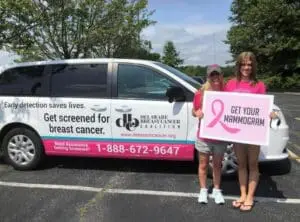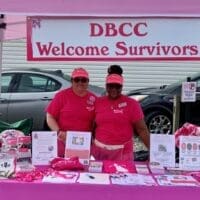
Celebrate the season by scheduling a mammogram today
There is significant evidence that early detection is the best tool in fighting breast cancer, as cancers caught early are more likely to be localized. Unfortunately, breast cancer statistics indicate that there is a higher incidence of death among women of color, especially black women, who are diagnosed with breast cancer.
“Delaware ranks number one in black women diagnosed with triple-negative breast cancer (TNBC), which is a more aggressive form of breast cancer,” Francesca Vogel, CEO of Delaware Breast Cancer Coalition (DBCC) said.
Research indicates that there has been a 43 percent decline in breast cancer deaths over the past 30 years due to more awareness of early detection, better treatments and other factors. Yet there is a mortality gap between black and white women. Although incidence rates are very close, black women have a 40 percent higher chance of dying of breast cancer and for black women under 50, the statistics are much higher.
The reason for this disparity is complex and multifactorial, according to the American Cancer Society. Social, economic and behavioral factors are part of the issue leading to higher mortality rates. Black women also have a higher rate of heart disease, obesity and diabetes. They are also less likely to breastfeed after childbirth, all of which increase the risk of breast cancer. Lack of health insurance or access to healthcare facilities contribute to the higher mortality rate as well. There is also research from the National Institute of Health that black women may be predisposed to TNBC due to biology and not due to lack of screening or access to healthcare.
However, some of the discrepancy can also be due to biology, as black women have a higher rate of TNBC and inflammatory breast cancer. TNBC gets its name because it is a form of cancer that is estrogen and progesterone receptor negative as well as HER2-negative. This means that the cancer does not respond to hormonal therapies in the same way as other types of cancer. About 10 to 12 percent of all breast cancers are TNBC and it tends to be more aggressive than other forms of breast cancer.

Mammograms and self examination are still the best method for finding breast cancer early
“Black women are twice as likely to be diagnosed with TNBC and are more likely to be diagnosed with a later-stage disease than white women,” Vogel said. “DBCC wants to change those statistics by increasing awareness of breast cancer risks through outreach and education as well as access to screenings by offering screenings to people who may not have access to them otherwise- even on weekends! The earlier we diagnose any type of cancer, the more likely there will be a good outcome. Another factor to point out is that it is not just women who can be diagnosed with breast cancer. Men are also at risk as one in 833 men are diagnosed with breast cancer every year according to the American Cancer Society.”
DBCC partners with the State of Delaware to offer centralized patient services for breastVogel explained that DBCC is constantly pioneering and growing partnerships with providers, employers and even non-traditional partners to expand mammogram accessibility throughout the state.
The women’s health screening team is embedded in the community, hospitals and community health fairs, they are here to help you connect the dots before, during and after your mammogram appointment,” Adriana Viveros-Sosa, Program Manager for Women’s Health Screening, said. “We serve with love and empower you though your mammogram journey.”
Vogel agreed with Viveros-Sosa, stating that the goal of DBCC was to help all men and women gain access to screenings and help them through their breast cancer journey.
“We want to help patients navigate through the various cultural and economic barriers that exist,” Vogel said. “In some cases, it goes beyond economic factors, lack of insurance or transportation. For some, it is a cultural issue that makes women and men hesitant to undergo screening. We try to address as many barriers as we can, including increased details about screenings, signage, scheduling transportation to help transport/from screenings, to helping someone to a screening or follow-up appointment. DBCC navigators provide in Spanish as well as Haitian Creole to move past the language barriers that are also a barrier to screening.”

Remind someone you love to schedule a mammogram today!
In February, DBCC hopes to reach out to another group who may not have access to screenings.
“We will be hosting an event with CAMP Rehoboth called “Love Yourself Self-Care Event,” which focuses on getting our LGBTQ+ community screened in a safe space,” Vogel said. “Our goal is to offer breast/chest screenings at CAMP Rehoboth, a well-known safe space for members of the LGBTQ community to get what could be a lifesaving screening.”
The mission of DBCC is to empower the community by raising awareness of breast health issues and increasing access to care through outreach, education and support services, while also facilitating early detection and treatment of breast cancer. To learn more about the Women’s Health Screening Program, visit https://debreastcancer.org/programs/womens-health-screening-propgram/.

Share this Post





